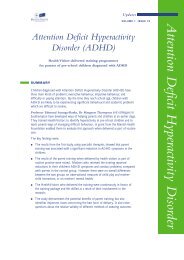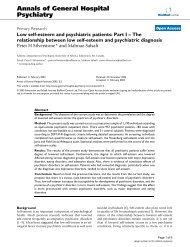are we paying enough attention? - Addiss
are we paying enough attention? - Addiss
are we paying enough attention? - Addiss
- No tags were found...
Create successful ePaper yourself
Turn your PDF publications into a flip-book with our unique Google optimized e-Paper software.
ADHD: PAYING ENOUGH ATTENTION?A RESEARCH REPORT INVESTIGATING ADHD IN THE UK“It is vital that children with ADHD <strong>are</strong> given access to the range ofmanagement strategies available as, without this, children with ADHD<strong>are</strong> simply learning to fail.”Dr Val Harpin, Consultant Paediatrician, Sheffield Children’s TrustTREATMENTAlmost all (98%) of the child and adolescent psychiatrists and paediatricians surveyed stated that acombination of behavioural therapy and pharmacological therapy together is the most effective treatment forADHD. 13 This is reflected in a number of published studies with most experts agreeing that the most effectiveway to treat ADHD is with a variety of different approaches. 1,4●Despite this, only one third (34%) of specialists surveyed who regard this as the best approach use it forall their patients. Child and adolescent psychiatrists and community paediatricians surveyed believed thatthe key barriers to the use of behavioural therapy and drug therapy together <strong>are</strong> p<strong>are</strong>ntal concerns aboutmedication (35%) and limited resources (25%) 13“It is recognised that ADHD and HKD cause considerable morbidity andshould be treated.”Scottish Intercollegiate Guidelines Network 5The range of treatments available for ADHD include: behavioural therapies (including therapy for families orindividuals); school-based training (including counselling and help with learning skills); social skills training;sensory-motor integration (or coordination training); p<strong>are</strong>nting support and pharmacotherapy.Psychostimulants <strong>are</strong> the standard pharmacotherapy for ADHD. Whilst stimulants <strong>are</strong> effective for many patients,a significant number of children still experience side-effects or a lack of efficacy. 5,24 Additionally there is somepublic concern that there is a gap bet<strong>we</strong>en what is known about psychostimulants and how they <strong>are</strong> used. 25“Effectively treating ADHD symptoms can provide the opportunity for peoplewith ADHD to overcome the disorder, interacting better with family andpeers and having the opportunity to achieve their potential academically,in employment and in life. It is important that those who need treatment forthis disorder have access to treatment.”Professor Eric Taylor, Consultant Child and Adolescent Psychiatrist, MRC Child Psychiatry Unit,Maudsley Hospital, LondonWIDER SUPPORTADHD is not simply about diagnosing the disorder and treating it with a single, or combined, therapy.The nature of the disorder, whether undiagnosed and untreated or recognised and managed by healthservices, requires greater input from a range of different sources to ensure continued support. The mostcritical points for a young person <strong>are</strong>:-●●●P<strong>are</strong>nts and the family networkEducation and schoolingSocial services and, where appropriate, the Youth and Criminal Justice systemIf optimal management of the disorder is to be achieved, then all parties need to be able to provide therelevant support for people coming to terms with living with ADHD.Page 10




